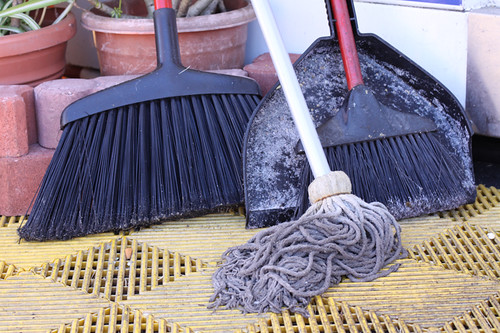Early in the book, O'Donnell talks about the "invisible work" that happens behind the scenes of housekeeping. She notes that even when the gender division of the actual day-to-day tasks are even, women still find themselves doing more of the mental work of keeping track of all these tasks. One woman quoted in the book (Sharon, an MBA at an investment firm) says:
"It's not just the laundry, it's the mental awareness of the laundry. I know my son has only seven pairs of pants. I know it's swimming day on Tuesday. I think through if his swimming stuff is packed up, including the swim cap. It's the small details. And anything related to a doctor's appointment, dentist, birthday parties, playdates, car pools, that's me."I've written about my own family's challenges in creating an equally shared parenting atmosphere. We've gone through our ten million tiny negotiations and are currently in a period where things are working pretty well. I am under no illusion that it is permanent, though. Schedules will change; our daughter will get new hobbies; work demands will increase; something in the house will break. What we have managed through all of those negotiations is creating a framework for figuring it out. Sometimes the waters are choppy, but I never fear that our ship is about to wreck. We just have to get through it until we're in smooth waters again.
So the thing that interested me in this quote wasn't the concept of "invisible work" because that's the thing that we really had to negotiate in our own household. My husband was always willing to do whatever work was necessary in the house or with our daughter, but for a long time, I was the one who figured out what that work was. It was my job to plan meals, make grocery lists, figure out what laundry needed to be washed when, and navigate the schedule for daycare. Now, some of this is because my skills (read, unhealthy obsession) in punctuality are a little more keen than his. But most of it is just that somehow that responsibility fell on my shoulders, almost innately. It was a series of conscious negotiations that led us out of those habits.
What interests me about that quote above, though, is how little that responsibility is talked about, especially when its analogous function in the corporate world is so pronounced.
We use economic/corporate-home life analogies all the time. We talk about motherhood as the "hardest job" in the world. We compare our time spent with our children as a return on investment. We talk about the mommy gap in terms of dollars and cents.
So why is it that this invisible work remains so invisible in the home when it is showcased in the corporate world. The "invisible" work is the planning, the strategizing, the structuring, the delegating, and the mapping. It's the work that can't be clocked with concrete tasks completed, and it's the work that often can't be finished in a given timeframe because it is ongoing and compounding. It is, essentially, the work of CEOs, managers, the "big wigs."
In the corporate world, most of us don't bat an eye that the CEO of McDonald's makes millions while the workers doing the actual labor of production don't make a living wage. Sure, some of us (myself included) point out the hypocrisy and unethical structure of this, but most people acknowledge that the CEO does a difficult task and deserves a higher salary for it. Managing all of the components of a corporation is mentally taxing, delicate work. If someone high up in the chain of command makes a mistake, the cost is substantial. And if someone that high up makes a great decision, the profit is immense.
I don't want to dwell too long on the connections between the home sphere and the corporate one. Personally, I think that we need to stop relying so heavily on capitalist narratives to frame all of our decisions and values. However, I feel there's a hypocrisy here. If we're going to recognize the value of planning and strategy in our corporate world, then we need to recognize those same skills when they take place behind playdates and piles of laundry.
At the very least, can't we use the connection to understand that someone who has been out of the workforce raising children and running a home has a set of very admirable and transferable skills at his or her disposal?





















